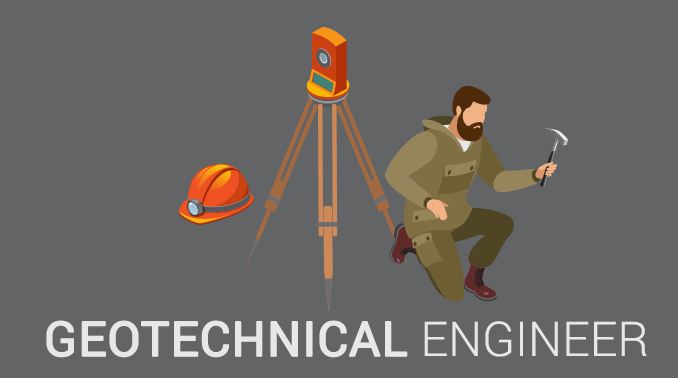What Does Geotheta Mean?
The Best Guide To Geotheta
Table of ContentsThe Greatest Guide To GeothetaIndicators on Geotheta You Need To KnowThe 5-Second Trick For GeothetaAn Unbiased View of GeothetaAn Unbiased View of Geotheta

They perform site investigations, collect examples, execute research laboratory tests, and assess information to review the suitability of the ground for construction jobs - Consulting Engineers. Based upon their findings, geotechnical designers supply suggestions for foundation layout, slope security, retaining structures, and reduction of geotechnical dangers. They team up with various other professionals, such as architects, structural engineers, and building and construction groups, to ensure that geotechnical factors to consider are incorporated right into the total task layout and application
By evaluating the habits and residential or commercial properties of dirt and rock, they can determine potential geotechnical hazards such as landslides, dirt negotiation, or incline instability. Their experience helps stop failings or accidents that could threaten lives and residential or commercial property. Below are some in-depth tasks and obligations of a geotechnical designer: Website Investigation: Geotechnical designers conduct site investigations to collect information on subsurface conditions.
They interpret the data to understand the buildings and actions of the soil and rock, including their strength, leaks in the structure, compaction features, and groundwater conditions. Geotechnical Evaluation and Design: Geotechnical designers examine the data gathered throughout site examinations to assess the stability and viability of the site for building projects. They execute geotechnical calculations and modeling to examine elements such as bearing capacity, negotiation, slope security, side earth pressures, and groundwater flow.
A Biased View of Geotheta
Structure Layout: Geotechnical engineers play an important duty in designing structures that can securely support the desired structure. They examine the soil conditions and lots requirements to identify the ideal structure kind, such as superficial foundations (e.g., footings), deep structures (e.g (https://forums.hostsearch.com/member.php?265240-geotheta)., stacks), or specialized methods like soil renovation. They think about aspects such as settlement limits, birthing capacity, and soil-structure interaction to develop ideal structure layouts
They review construction plans, monitor site activities, and carry out field examinations to validate that the design referrals are complied with. If unanticipated geotechnical issues arise, they evaluate the scenario and give referrals for removal or modifications to the layout. Danger Evaluation and Reduction: Geotechnical engineers examine geotechnical threats and threats related to the job site, such as landslides, liquefaction, or dirt erosion.

Cooperation and Interaction: Geotechnical engineers function very closely with various other professionals involved in a job, such as engineers, structural designers, and building teams. Reliable communication and partnership are vital to integrate geotechnical considerations into the total task design and building procedure. Geotechnical designers supply technological expertise, answer questions, and make certain that geotechnical demands are met.
The Geotheta Ideas
Right here are some types of geotechnical designers: Foundation Engineer: Foundation engineers specialize in developing and assessing foundations for structures. They assess the dirt conditions, lots requirements, and site characteristics to determine the most proper foundation type and design, such as superficial foundations, deep structures, or specialized techniques like heap structures.
They assess the factors influencing slope stability, such as dirt residential properties, groundwater conditions, and incline geometry, and create approaches to prevent slope failures and mitigate dangers. Quake Designer: Quake engineers concentrate on evaluating and developing structures to withstand seismic forces. They analyze the seismic danger of a website, examine soil liquefaction potential, and establish seismic layout standards to make sure the safety and strength of frameworks during quakes.
They perform area testing, accumulate examples, and examine the accumulated information to characterize the soil residential properties, geologic formations, and groundwater conditions at a website. Geotechnical Instrumentation Engineer: find this Geotechnical instrumentation engineers concentrate on monitoring and measuring the actions of dirt, rock, and structures. They set up and maintain instrumentation systems that monitor elements such as dirt settlement, groundwater degrees, incline movements, and structural variations to evaluate performance and offer very early cautions of potential concerns.
Not known Factual Statements About Geotheta
They carry out tests such as triaxial examinations, combination examinations, straight shear tests, and leaks in the structure examinations to collect information for geotechnical evaluation and layout. Geosynthetics Designer: Geosynthetics engineers specialize in the design and application of geosynthetic products, such as geotextiles, geogrids, and geomembranes. They use these materials to improve soil stability, reinforce inclines, supply drain remedies, and control erosion.
They tend to be investigative people, which means they're intellectual, reflective, and investigative. They are interested, systematic, logical, analytical, and rational. Some of them are likewise social, indicating they're kind, charitable, cooperative, person, caring, valuable, compassionate, tactful, and pleasant - Geo Tech Engineering.
In the office setting, geotechnical designers utilize specialized software devices to carry out estimations, produce designs, and analyze data. They prepare records, evaluation task specs, communicate with customers and employee, and coordinate project activities. The workplace setup provides a conducive atmosphere for study, evaluation, and cooperation with various other experts included in the task.
What Does Geotheta Mean?
They frequently check out job sites to conduct site investigations, assess geotechnical conditions, and collect data for analysis. These brows through include traveling to different locations, in some cases in remote or challenging surfaces. Geotechnical designers may perform soil sampling, conduct examinations, and screen building activities to guarantee that the geotechnical aspects of the task are being applied appropriately.
Geotechnical engineers likewise work in specialized geotechnical labs. In these facilities, they perform experiments, perform examinations on soil and rock examples, and analyze the engineering properties of the materials. Geotechnical research laboratory engineers function extensively in these settings, managing screening tools, running tools, and taping information. They team up with other lab personnel to ensure exact and dependable testing results.